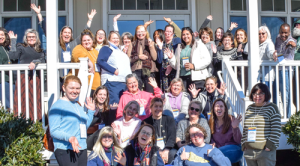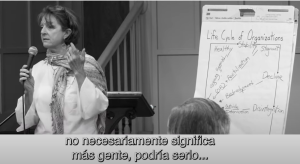Episcopal News Headlines
latest headlines, summaries, stories
- Navajoland calls for prayers as Oak Ridge Fire continues to burn through Navajo Nation in northeastern Arizona
[Episcopal News Service] The Episcopal Church in Navajoland is calling for prayers as a wildfire that sparked June 28 on the Navajo Nation in northeastern Arizona continues to burn. The wildfire, called the Oak Ridge Fire, has so far burned 10,623 acres and is 0% contained. “Our church remains open for prayer and emotional support by those impacted by the fire,” the communications office for the Farmington, New Mexico-based diocese wrote in a July 1 update on Navajoland’s website. “We invite anyone in need of comfort or connection to join us in prayer.” The Navajo Nation is the largest Native American tribe by both land and tribal enrollment. With the exception of Colorado, its reservation occupies a large portion of the Four Corners region, including portions of northeastern Arizona, northwestern New Mexico and southeastern Utah. The cause of the Oak Ridge Fire, which ignited 8 miles southwest of Window Rock, Navajo Nation’s capital, is unknown, though officials have confirmed that it was human-caused, possibly by wood haulers. Navajo Nation President Buu Nygren declared a state of emergency on June 29. So far, 300-500 people, including some Episcopalians in the diocese, have evacuated their homes, and 508 firefighters are on the ground. “We also want to express our sincere gratitude to the firefighters and first responders who work tirelessly around the clock to keep our communities safe,” the update said. Navajo Nation Animal is also sheltering pets and livestock. Some Navajoland Episcopalians’ sheep camps have been affected by the fire, according to the update. Good Shepherd Mission, an Episcopal church in Fort Defiance, Arizona, 6.7 miles north of Window Rock, is closest to the wildfire. Shelters in Fort Defiance and Ganado are providing food, water and emotional support services to evacuees. The Episcopal Church in Navajoland’s website will post updates as more information becomes available.
- New Navajoland diocese inspires talk of Indigenous self-determination in South Dakota
[Episcopal News Service] Indigenous Episcopalians in South Dakota, inspired by Navajo Episcopalians’ recent creation of their own missionary diocese, are taking steps to explore the possibilities and challenges of forming their dozens of South Dakota congregations into an independent diocese. On June 28, at an annual Indigenous gathering known as the Niobrara Convocation, members voted to begin researching the concept. Indigenous leaders, with the backing of South Dakota Bishop Jonathan Folts, plan to form an exploratory committee with two members from each of the diocese’s eight mission areas that serve Native American reservations in the state. The goal, as it was for the missionary diocese known as Navajoland, would be to achieve greater self-determination, including the calling of their own bishop. Like Navajoland, Indigenous Episcopalians with deep roots in the Dakotas have ties to The Episcopal Church dating back generations. At the same time, church leaders acknowledge that the two contexts are very different, and they caution that any such successful effort in South Dakota would first require a major investment of time, research, deliberation and preparation. “There’s been talk of it off and on through the years and what that would look like,” Warren Hawk, the outgoing Niobrara itancan, or convocation chair, told Episcopal News Service this week. The first step, approved last weekend, was “just to take a look at it.” Hawk had raised the idea with Folts earlier last week while they were attending a meeting of Executive Council, of which both are members. Executive Council is The Episcopal Church’s governing body between meetings of General Convention. Executive Council had just voted to accept the constitution for the newly created Missionary Diocese of Navajoland. The new missionary diocese includes congregations in Arizona, New Mexico and Utah that formerly were part of a mission area created by The Episcopal Church in 1977 to serve Navajo Nation communities. During Executive Council’s discussions, Hawk mentioned there had been “whispers” in South Dakota for many years about whether Indigenous congregations there also should pursue self-determination, but no formal steps had been taken toward forming a new diocese. Folts invited Hawk to draft an exploratory proposal for presentation at the 153rd annual Niobrara Convocation, held June 26-29 in Eagle Butte, South Dakota, and hosted by the Cheyenne River Episcopal Mission. Folts told ENS that in his June 28 speech to Niobrara attendees he encouraged them to engage with the idea, and “let’s start turning this into open conversation and dialogue.” Navajo Episcopalians had worked long and hard to achieve missionary diocese status, which has been celebrated churchwide. Doing the same in South Dakota wouldn’t be easy, Folts said, but he sensed many Episcopalians in his diocese had a passion for trying. “Let this year be a year of research and conversation,” he said. The Diocese of South Dakota has more than 50 Indigenous congregations spread across its eight mission areas: Cheyenne River, Mni Sose, Pine Ridge, Rosebud East, Rosebud West, Santee Yankton, Sisseton and Standing Rock. Those mission areas and congregations form the core of the Niobrara Convocation, also known as the Niobrara Deanery. The convocation and the Diocese of South Dakota have roots in the Missionary District of Niobrara, founded by the church in 1871 in the Dakota Territory. In 1883, Niobrara was incorporated into the Missionary District of South Dakota, which became the Diocese of South Dakota in 1971. (South Dakota achieved statehood in 1889.) Niobrara has continued to serve as a unifying convocation, primarily for Episcopalians of Lakota, Dakota and Nakota heritage, also known collectively as the Sioux, Oceti Sakowin or people of the Seven Council Fires. Typically hosted by a different South Dakota church each year, Niobrara’s annual June gatherings also bring together some members from outside the Diocese of South Dakota. Potential challenges to elevating Niobrara to a missionary diocese include canonical requirements, administrative structure, financial viability and clergy deployment, as well as the question of whether and how to accommodate members outside South Dakota. Folts also said that if the research and discernment process eventually produced a formal proposal to separate Niobrara from the Diocese of South Dakota, the plan likely would need the approval of a large majority of both the Niobrara congregations and those remaining in the South Dakota diocese. Navajoland, by contrast, did not need direct approval from the dioceses of Arizona, Rio Grande or Utah, because it already was established separately as a churchwide mission whose bishop had been appointed by the House of Bishops. The Episcopal Church’s 81st General Convention authorized Navajoland to form a missionary diocese in 2024, and its creation was finalized last month by Executive Council’s vote. Despite the challenges in South Dakota, Hawk said he and other Niobrara members are excited to study the concept. “It’s really just to look into the possibilities of it,” Hawk told ENS. “I’m hopeful that it would happen, but there’s a lot to consider, the organizational aspect of it, how it would proceed, capabilities.” Whatever the outcome, he thinks the conversations will spark renewed interest in planning for The Episcopal Church’s future in South Dakota’s Indigenous communities. “All of this is in essence to encourage a lot of our church membership to get back involved with our mission churches,” he said. – David Paulsen is a senior reporter and editor for Episcopal News Service based in Wisconsin. He can be reached at dpaulsen@episcopalchurch.org.
- Liverpool meeting examines Anglican Church’s involvement in transatlantic chattel slavery
[Church of England] More than 150 people from across the world attended a gathering on the Anglican Church’s involvement in transatlantic chattel slavery and its contemporary legacies, addressed by a series of speakers from the United Kingdom, the United States, Europe, Africa and the Caribbean. The “Truth Telling” event, which took place June 23-25, was held jointly by the Church of England’s Racial Justice Unit and Senior Research Fellow Leona Vaughn for the University of Liverpool, with support from the Diocese of Liverpool. Taking place in the city of Liverpool, it included addresses as well as a tour and talks on the city’s historical links with the transatlantic trade in enslaved people and the work to progress racial justice. The Church of England’s lead bishops for racial justice, Croydon Bishop Rosemarie Mallett and Kirkstall Bishop Arun Arora, attended the event. Mallett gave the sermon at a service for the gathering held at Liverpool Cathedral. Archbishop of York Stephen Cottrell, who spoke at the conference, said the church was “humbled” by the truth of its “shameful” historical involvement in the “evil” commodification and enslavement of human beings. Speaking at the start of the conference, he quoted the Ghanian proverb – “Until the lion has told his story, the hunter will always be a hero” – as a means of encouraging the church to acknowledge how individuals and church institutions have benefited from profits from the transatlantic slave trade. He first heard the proverb in Ghana last November when visiting dungeons in the Cape Coast Castle, used to imprison enslaved Africans before they were loaded onto ships to cross the Atlantic. He said it was “humbling that it was the church of Jesus Christ that was so invested in the horrific hunting down, enslavement and commodification of human beings that took place over many centuries through transatlantic chattel enslavement. So first of all, at this truth telling conference, let us in the Church of England acknowledge that we have been humbled by this truth.” Edmonton Bishop Anderson Jeremiah, who addressed the conference, said: “To embody the lived experiences of our people, our journey toward justice and peace must be grounded in truth telling.“Without accountability, without our commitment to speak, to listen and, crucially, to live the truth – freedom and peace will remain distant and elusive.“When we embrace the truth revealed in Christ, the way, the truth and the life, it will set us free.” The conference heard from speakers including Lancaster University history professor William Pettigrew, who has led research into the 11,000 investors – including Church of England clergy – who financed Britain’s contribution to the transatlantic traffic in enslaved people. There were addresses from the Rev. Kelly Brown Douglas (via video link), visiting professor at Harvard Divinity School in the U.S., and the Rev. Stephanie Sellers from The Episcopal Church, as well as from representatives of the United Nations Educational, Scientific and Cultural Organization (UNESCO). U.S. Roman Catholic Monique Maddox, president and CEO of the Descendants Truth & Reconciliation Foundation, whose enslaved family was sold by the Jesuit order in the 19th century, and the Rev. Tim Kesicki S.J., from the Jesuit order, also spoke via video link to the conference. During the 18th century, Liverpool was Britain’s main slaving port, with ships from Liverpool carrying around 1.5 million Africans across the Atlantic in conditions of great cruelty. People attending the conference took part in a tour of buildings near the Port of Liverpool, including Liverpool parish church, burial place of some of the city’s richest slave merchants. The church has a memorial to Abell, an enslaved man who was brought to Liverpool and is recorded as having been buried in the churchyard in 1717. Liverpool’s Black community had campaigned for the memorial, to acknowledge his importance as Liverpool’s first recorded Black resident. The Rev. Sharon Prentis, the Church of England’s deputy lead director for racial justice, said: “For years, the church has been far too comfortable in a state of amnesia regarding the horrors of the transatlantic trade in enslaved people. “This gathering’s aim was to affirm that Christ as our compass guides us as we confront the past concerning chattel slavery. Truth-telling enables the entire church to address its history with honesty, so that it can in humility and with confidence seek justice, healing and unity for all of God’s children.”
- Tennessee bishop announces plans to step down in 2027 after 20 years leading diocese
[Episcopal News Service] Tennessee Bishop John Bauerschmidt announced June 30 that he plans to step down from leading the Nashville-based diocese in January 2027, and called for the election of his successor. Bauerschmidt, a native of Virginia, has served as bishop of the Diocese of Tennessee since 2007. His diocese includes Episcopal congregations in the central third of Tennessee, one of three dioceses in the state. “Serving as your diocesan bishop has been the singular privilege of my ordained ministry, and a personal joy,” Bauerschmidt said in his announcement. “I am grateful to all of you for your support and encouragement in this work. I am especially grateful to my wife, Caroline, who has accompanied me in this ministry.” The diocese’s standing committee also released a message thanking Bauerschmidt for his “nearly 20 years of faithful and loving service among us – for his deep care, steady leadership, and abiding devotion to Christ and Christ’s church.” The standing committee said it would release more details July 8 about the upcoming bishop search process and the work of the search and transition committees. A webpage has been created for updates. Before his consecration as a bishop, Bauerschmidt was rector of Christ Church in Covington, Louisiana. He was ordained a priest in 1985 in the Diocese of Upper South Carolina and served at churches in Massachusetts and North Carolina. He also was a chaplain while studying at Oxford University in England, where were earned a doctorate in Christian ethics in 1996. In recent years, Bauerschmidt, known as one of the church’s more theologically conservative bishops, has been a prominent figure in churchwide efforts to foster greater “communion across difference,” engaging in dialogue involving Episcopalians at all points on the theological spectrum.
- Anglican, Pentecostal leaders celebrate unity and shared mission
[Anglican Communion News Service] The fourth annual meeting of the International Pentecostal–Anglican Commission took place at St. Columba’s House in Woking, England. Convened with the support of the Anglican Consultative Council and the Pentecostal World Fellowship, the commission continues to explore ecumenical dialogue between the Anglican Communion and Pentecostal churches worldwide. This year’s meeting, which took place June 21-27, built on previous dialogues by deepening discussions of holiness, sacramentality, worship and the call to renewal. Emphasis was placed on the theme of mission and service, with the presentation of papers that will contribute to a final report due in 2026. Working groups were established to take this forward in preparation for next year’s gathering. Participants shared stories and case studies from their own contexts, highlighting the dynamic and evolving relationships between Anglicans and Pentecostals globally. Morning and evening prayers were led alternately by members of each tradition, fostering a spirit of mutual respect and worshipful fellowship. Reflecting on the significance of the meeting, Christopher Wells, director of unity, faith and order at the Anglican Communion Office, said, “This meeting of IPAC was refreshing and invigorating, as we further refined our shared views about prayer and worship, holiness, and mission, as given by God to the one body of the church. We are learning together about the rich diversity of tribes and tongues and nations, as all of Scripture affirms; there is no one-size-fits-all style of worship, or form/pattern of ecclesial gathering. Charismatics who are members of every church also have a role to play in urging inter-ecclesial charity and cooperation, in the one Spirit, one Lord, one faith, and one (water) baptism (Ephesians 4). God is calling us to view our communions as complementary and non-competitive, in order that we may grow and walk together, and come to ‘one mind’ (1 Peter 3:8) about essentials.” The commission also engaged with local Anglican ministry in the Diocese of Guildford, attending Sunday morning worship at St. Saviour’s, Guildford, and Choral Evensong at Guildford Cathedral, where Bishop Royce Victor, cochair of the commission, preached. Members met with Guildford Bishop Andrew Watson and members of his clergy team to hear about local mission and church planting initiatives. The Rev. Jacqueline Grey of the Australian Christian Churches offered the following reflection on behalf of the Pentecostal delegation: “Although a new dialogue, the group shares a wonderful sense of unity and joy. Our common passion for mission provided opportunities for rich discussion and debate. This was furthered by hearing from practitioners in the local Diocese of Guildford about new initiatives in mission and church planting being developed under the supportive leadership of Bishop Andrew Watson. We praise God for these testimonies as we discover how much our communions hold in common and the gifts we offer one another in the area of mission.”



